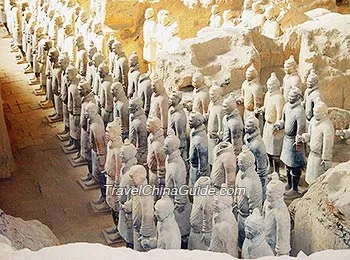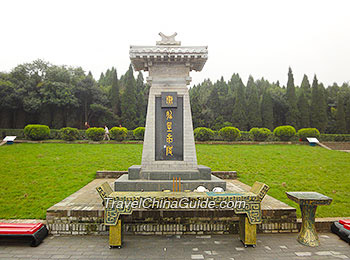Qin Shi Huang (Hanzi: 秦始皇) (November atau Desember 260 SM – 10 September 210 SM),
dilahirkan dengan nama Ying Zheng (贏政), juga dipanggil Shi Huang Di yang
artinya adalah Kaisar Pertama, adalah raja dari Negara Qin dari 247 SM sampai
221 SM, setelah mempersatukan Tiongkok dengan menaklukkan 6 negara lainnya, ia
kemudian mendirikan Dinasti Qin dan mengangkat diri menjadi kaisar dari
Tiongkok yang bersatu – dari 221 SM hingga 210 SM – bertakhta dengan sebutan
Kaisar Pertama.
Setelah menyatukan Tiongkok, dia dan perdana menterinya Li Si menciptakan berbagai perubahan yang ditujukan untuk memperkuat persatuan, dan mereka menjalankan banyak reformasi dalam pemerintahan, menyatukan tulisan baku, alat ukur standar dan juga meneruskan pembangunan Tembok Besar yang sudah ada sejak Zaman Negara-negara Berperang. Walaupun dengan kekuasaan tangan besi, Qin Shi Huang masih dianggap oleh sejarah Tiongkok hingga sekarang sebagai pendiri Tiongkok masa lalu. Persatuan bangsa Tiongkok telah berlangsung lebih dari dua ribu tahun.
Kaisar Pertama wafat saat melakukan ekspedisi ke seluruh negeri. Perjalanan ini dilakukan untuk mengambil hati rakyat dan para adipati serta pangeran dari negara-negara yang ditaklukannya. Di tengah perjalanan ia bertemu kembali dengan Xu Fu, seorang yang diperintahkannya untuk mencari “obat keabadian” atau disebut juga “obat panjang umur”. Untuk menghindari kemarahan sang kaisar, Xu Fu berkelit dengan mengatakan bahwa perjalanan untuk mencari obat tersebut sangat sulit, karena obat tersebut berada di puncak gunung sebuah pulau di tengah lautan. Xu Fu berencana menghindar dari tugas kaisar tersebut dengan mengatakan bahwa kaisar harus menangkap seekor ikan raksasa dahulu, namun dengan berani kaisar berhasil memanah seekor ikan raksasa dan Xu Fu harus menuruti tugas kaisar. Bagaimanapun juga Xu Fu yang telah memprediksi bahwa ia tidak akan bisa menemukan obat keabadian dan jika ia pulang dengan tangan hampa, maka kaisar pasti akan membunuhnya. Ia dengan senang hati menerima tugas dari kaisar tersebut, dengan syarat kaisar menyertakan 500 pemuda – pemudi dalam perjalanannya untuk dipersembahkan kepada dewa. Namun Xu Fu berlayar untuk dan tidak pernah kembali. Diperkirakan Xu Fu mendarat di Jepang.
Kaisar wafat dan menginginkan putera pertama bernama Fusu yang menggantikannya . Namun pesan kaisar pertama tersebut tidak pernah sampai, karena Zhao Gao, kasim kepercayan sekaligus penyampai pesan terakhir kaisar pertama bersekongkol dengan Li Si untuk mengubah pesan kaisar pertama menjadi mengangkat anak ke-26 kaisar pertama, Huhai menggantikan ayahnya dan menyuruh Fusu serta Jenderal Meng Tian bunuh diri dengan tuduhan melakukan pemberontakan. Zhao Gao melakukan hal ini karena ia ingin mempertahankan kedudukannya, karena ia kan dicopot dari jabatannya jika ketahuan suka menjilat dan korup oleh Fusu, sedangkan Lisi karena ia pernah berseteru dengan Fusu saat menangani masalah cendekiawan aliran Konfusius.
Setelah menyatukan Tiongkok, dia dan perdana menterinya Li Si menciptakan berbagai perubahan yang ditujukan untuk memperkuat persatuan, dan mereka menjalankan banyak reformasi dalam pemerintahan, menyatukan tulisan baku, alat ukur standar dan juga meneruskan pembangunan Tembok Besar yang sudah ada sejak Zaman Negara-negara Berperang. Walaupun dengan kekuasaan tangan besi, Qin Shi Huang masih dianggap oleh sejarah Tiongkok hingga sekarang sebagai pendiri Tiongkok masa lalu. Persatuan bangsa Tiongkok telah berlangsung lebih dari dua ribu tahun.
Kaisar Pertama wafat saat melakukan ekspedisi ke seluruh negeri. Perjalanan ini dilakukan untuk mengambil hati rakyat dan para adipati serta pangeran dari negara-negara yang ditaklukannya. Di tengah perjalanan ia bertemu kembali dengan Xu Fu, seorang yang diperintahkannya untuk mencari “obat keabadian” atau disebut juga “obat panjang umur”. Untuk menghindari kemarahan sang kaisar, Xu Fu berkelit dengan mengatakan bahwa perjalanan untuk mencari obat tersebut sangat sulit, karena obat tersebut berada di puncak gunung sebuah pulau di tengah lautan. Xu Fu berencana menghindar dari tugas kaisar tersebut dengan mengatakan bahwa kaisar harus menangkap seekor ikan raksasa dahulu, namun dengan berani kaisar berhasil memanah seekor ikan raksasa dan Xu Fu harus menuruti tugas kaisar. Bagaimanapun juga Xu Fu yang telah memprediksi bahwa ia tidak akan bisa menemukan obat keabadian dan jika ia pulang dengan tangan hampa, maka kaisar pasti akan membunuhnya. Ia dengan senang hati menerima tugas dari kaisar tersebut, dengan syarat kaisar menyertakan 500 pemuda – pemudi dalam perjalanannya untuk dipersembahkan kepada dewa. Namun Xu Fu berlayar untuk dan tidak pernah kembali. Diperkirakan Xu Fu mendarat di Jepang.
Kaisar wafat dan menginginkan putera pertama bernama Fusu yang menggantikannya . Namun pesan kaisar pertama tersebut tidak pernah sampai, karena Zhao Gao, kasim kepercayan sekaligus penyampai pesan terakhir kaisar pertama bersekongkol dengan Li Si untuk mengubah pesan kaisar pertama menjadi mengangkat anak ke-26 kaisar pertama, Huhai menggantikan ayahnya dan menyuruh Fusu serta Jenderal Meng Tian bunuh diri dengan tuduhan melakukan pemberontakan. Zhao Gao melakukan hal ini karena ia ingin mempertahankan kedudukannya, karena ia kan dicopot dari jabatannya jika ketahuan suka menjilat dan korup oleh Fusu, sedangkan Lisi karena ia pernah berseteru dengan Fusu saat menangani masalah cendekiawan aliran Konfusius.
Emperor Qin Shihuang's Mausoleum
Emperor Qin Shi Huang (259 BC - 210 BC) fascinates people when they talk about the Great WallTerracotta Warriors and Horses
- his two greatest achievements to China. As the first emperor of
China, he indeed has a profound influence on Chinese history and
culture. and the
How did he come to the throne?
Emperor
Qin Shi Huang, born as Ying Zheng in 259 BC, was the son of the king of
the Qin State. At the age of thirteen, he succeeded his father's
regality. Ying Zheng was very aggressive and ambitious at an early age.
He assumed full power at 22 by ridding himself of his premier, Lu Buwei,
who acted as regent while he was a minor. He wanted to unify and
subjugate all the states like Han, Zhao, Wei, Chu, Yan and Qi by the
powerful political, economic and military strength of the Qin State.
Ying Zheng realized his ambition and built the first feudal and
centralized empire in Chinese history in 221 BC. This was what we called
- the Qin Dynasty (221 BC - 206 BC). Ying Zheng was the first emperor
of a united China, so he proclaimed himself Qin Shi Huang.
"Qin Shi Huang"
When
Ying Zheng unified China, he considered his achievement surpassing the
legendary "San Huang (three emperors)" and "Wu Di (five sovereigns)". He
created a new title for himself: "Huangdi" together with "Shi (means
the first)", hence get the name "Qin Shi Huang" or "Qin Shi Huangdi",
which means he was the first emperor of China. He hoped his descendants
would follow in his steps to rule China for eternity.
Achievements and Defects
In
order to consolidate the nascent empire, Qin Shi Huang reformed
politics, economy and culture. In politics, he abolished the hereditary
vassal enfeoffment system and established prefectures and counties,
ruled directly by the emperor. Based on the original rules of the Qin
State, the emperor adopted some regulations of other rival states to
form a workable law of the Qin Dynasty. In economy, he claimed that both
the agriculture and commerce were very important. People should have
them developed together. Besides, tax system began to function and
coinage and metrology were all standardized. In culture, the emperor
unified the Chinese characters in writing, which promoted the
development of the Chinese culture. However, he also suppressed scholars
who were not to his liking. Consequently, many scholars involved were
killed in Xianyang.
Achievements and Defects
 |
| Qin Terracotta Army |
The symbol of the Chinese ancient
civilization, the Great Wall bears witness to Qin Shi Huang's
centralism. He ordered conscript laborers to link together the defensive
works against marauding nomads already built by the former states. That
was the forerunner of the modern Great Wall. Another world-famous
achievement is the Terracotta Warriors and Horses in Xian, which was
discovered nearby the mausoleum of Emperor Qin Shi Huang. Both are the
wonders of China. But during their construction, countless conscripts
lost their lives. It's really wasting manpower and resources.
Decline of the First Emperor |
| Emperor Qin Shihuang's Mausoleum |














Tidak ada komentar:
Posting Komentar